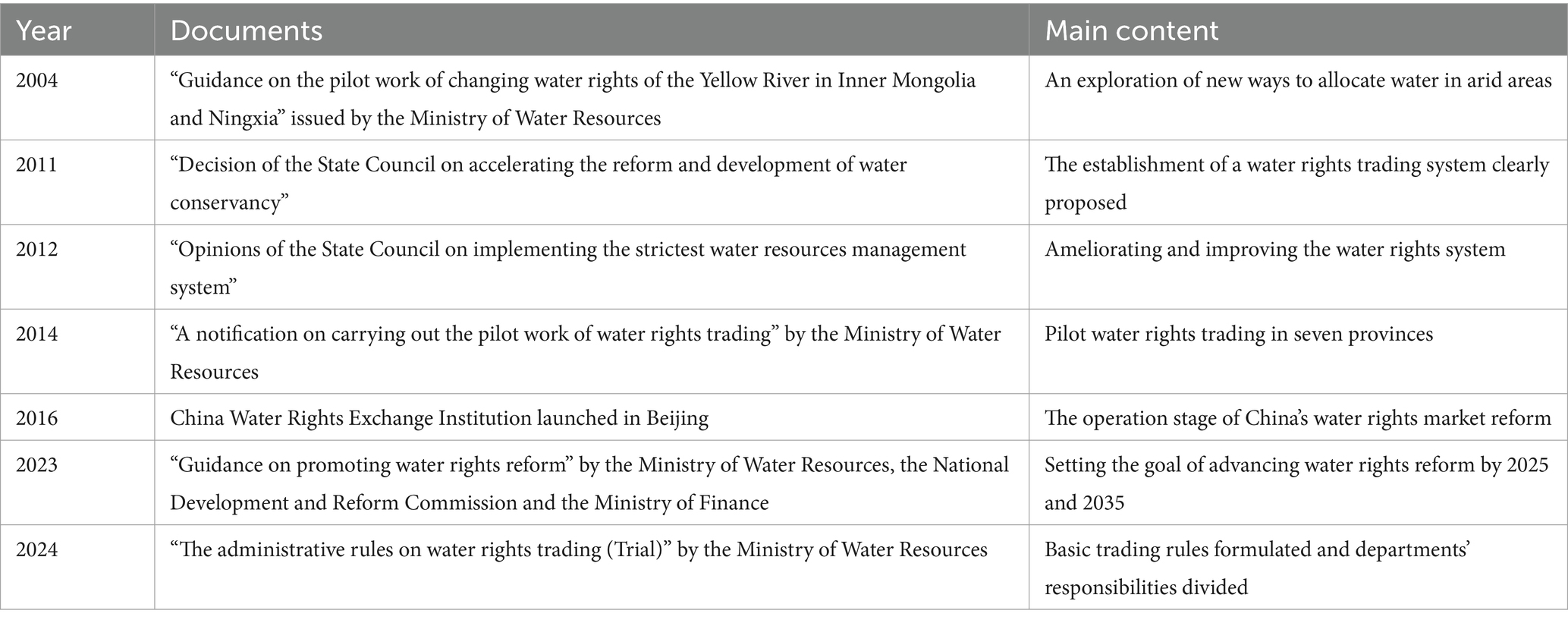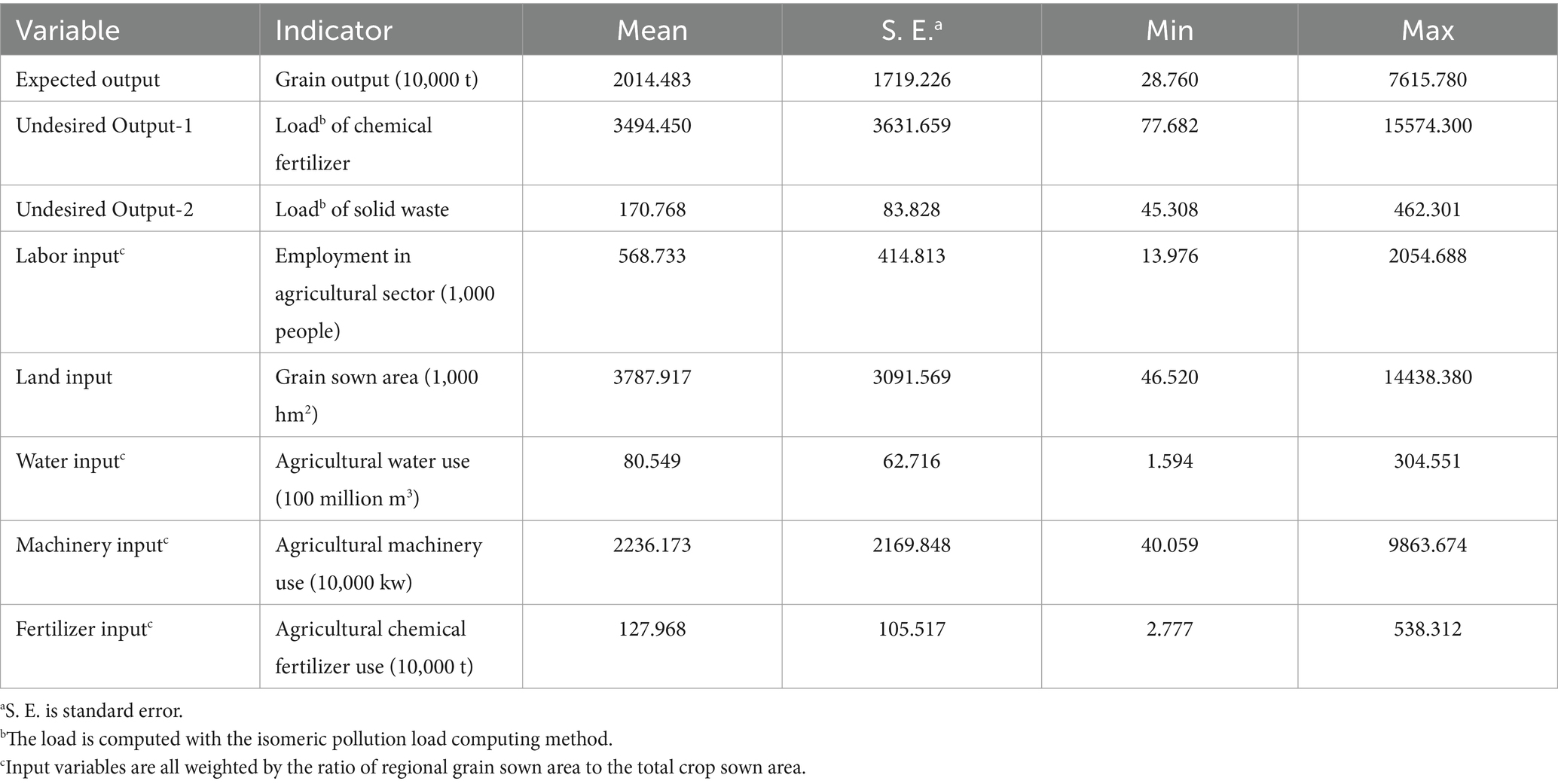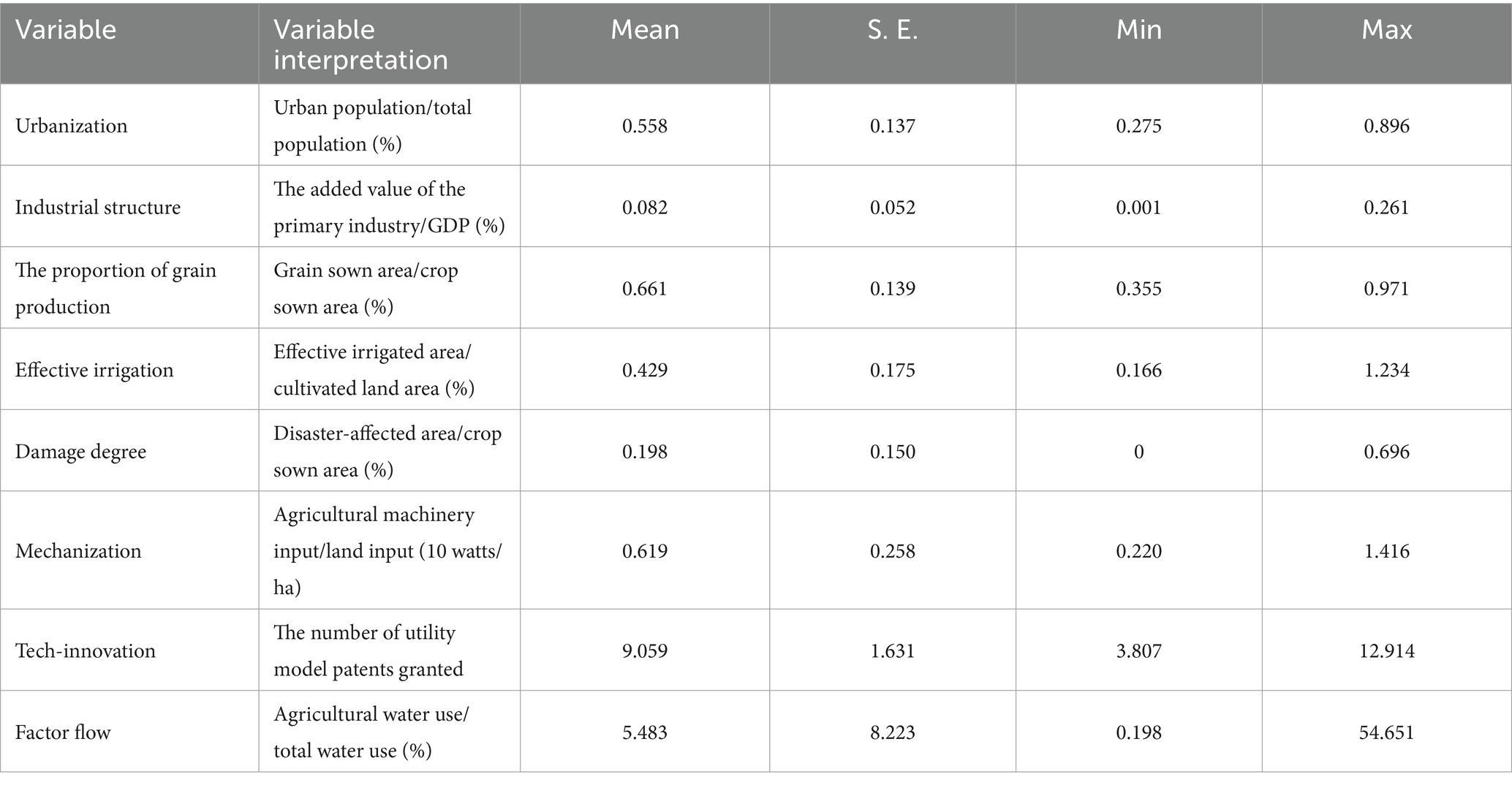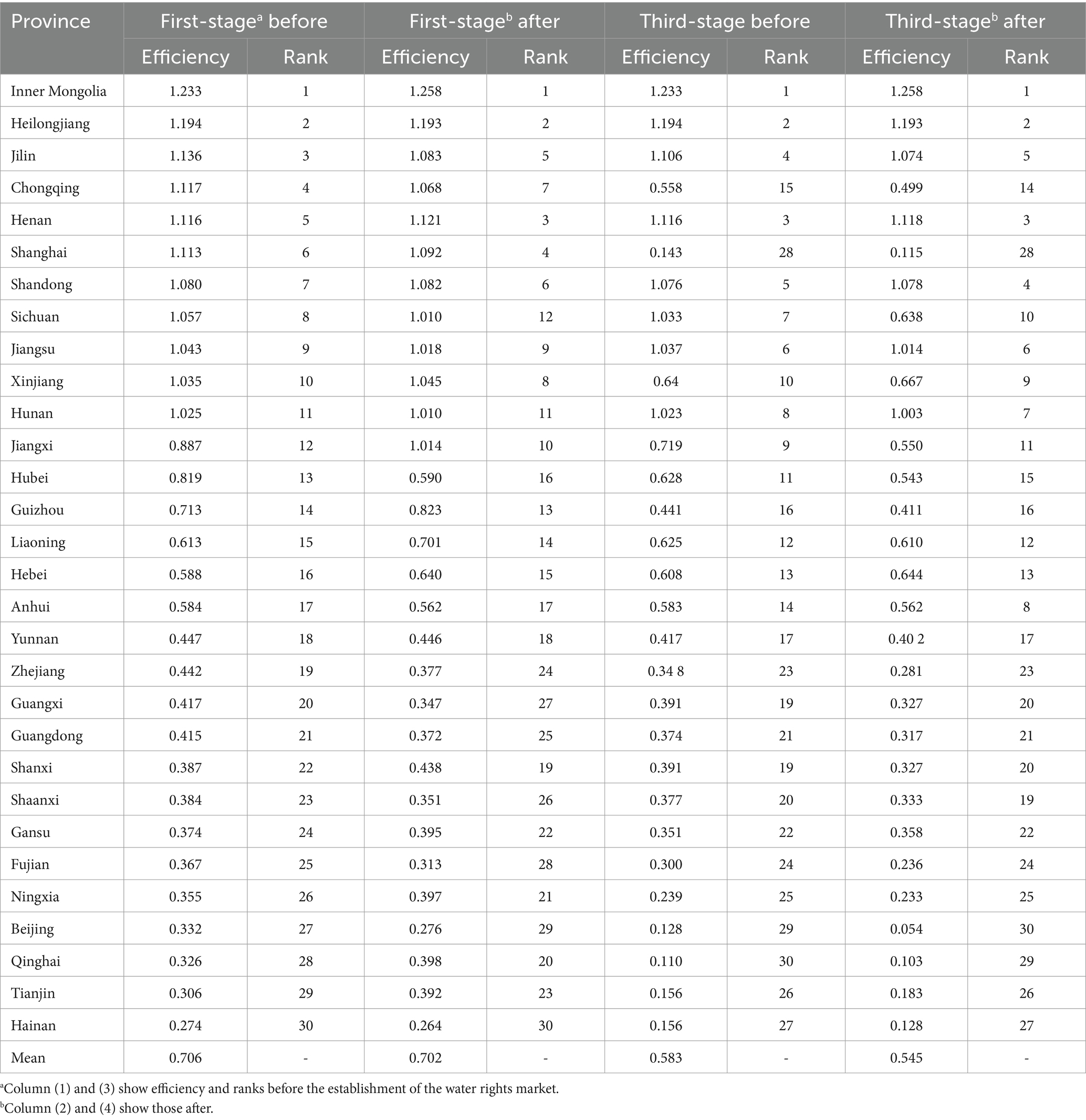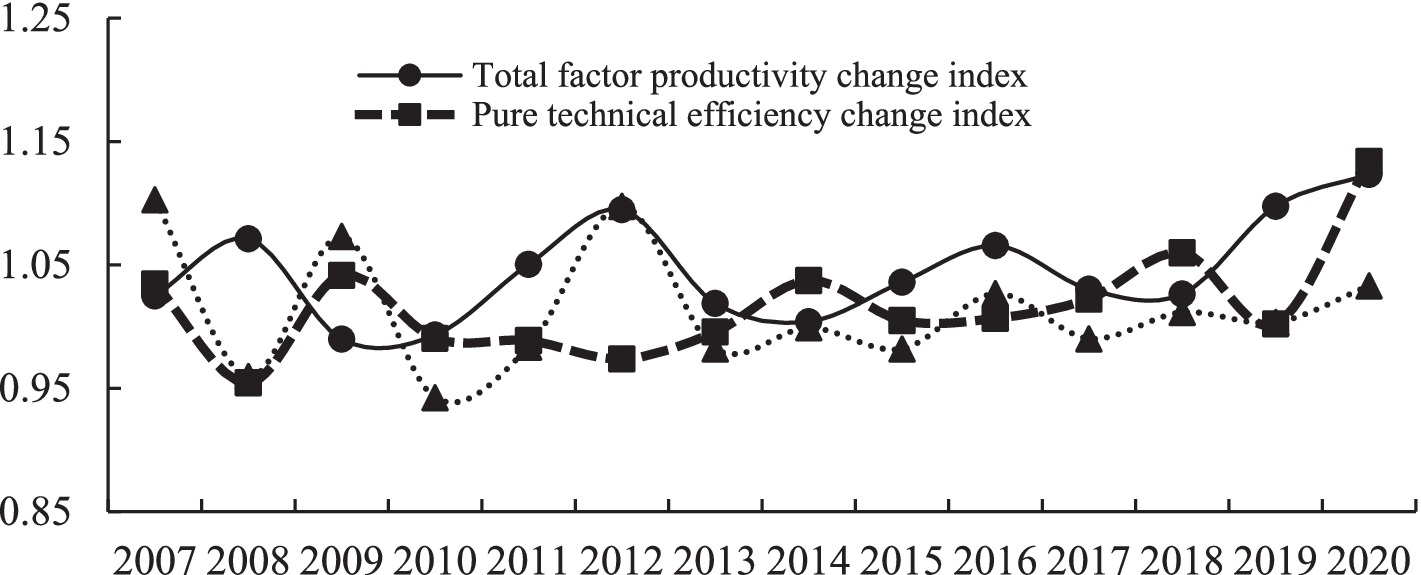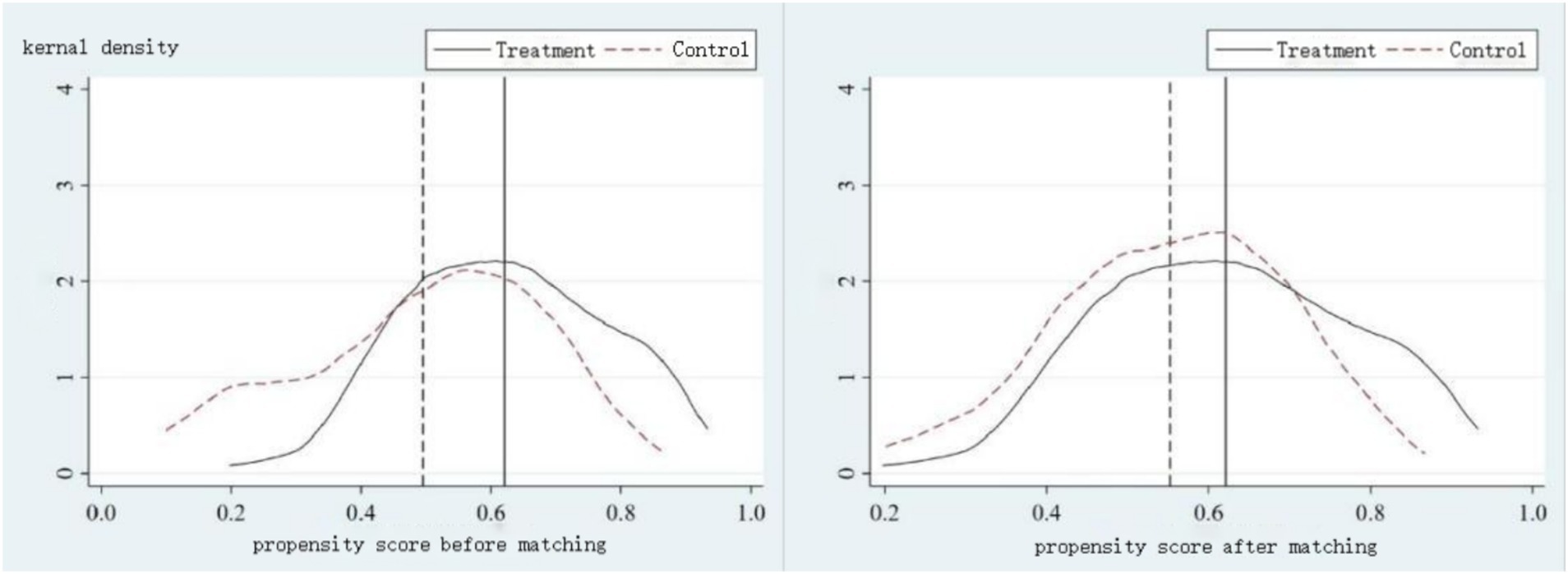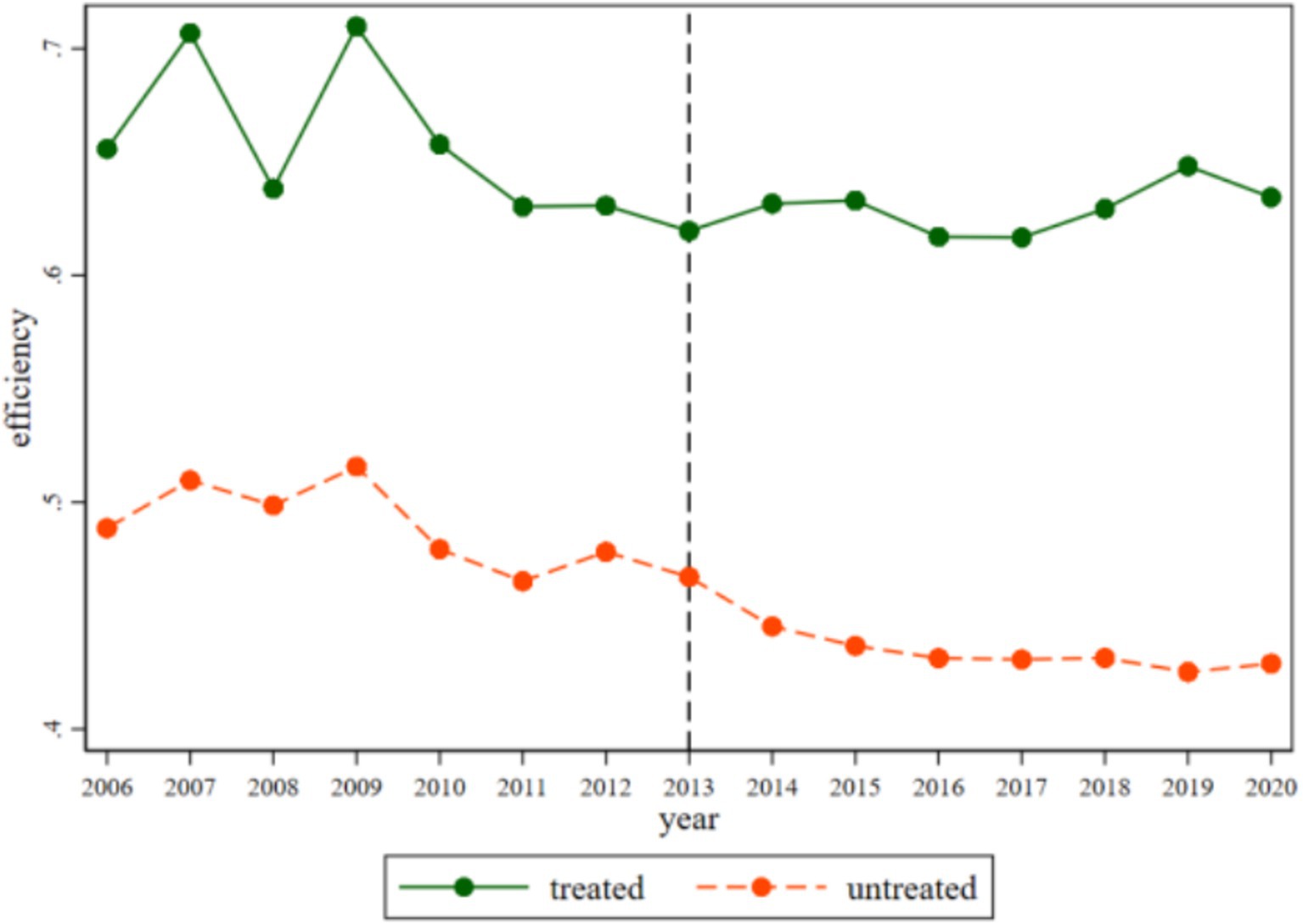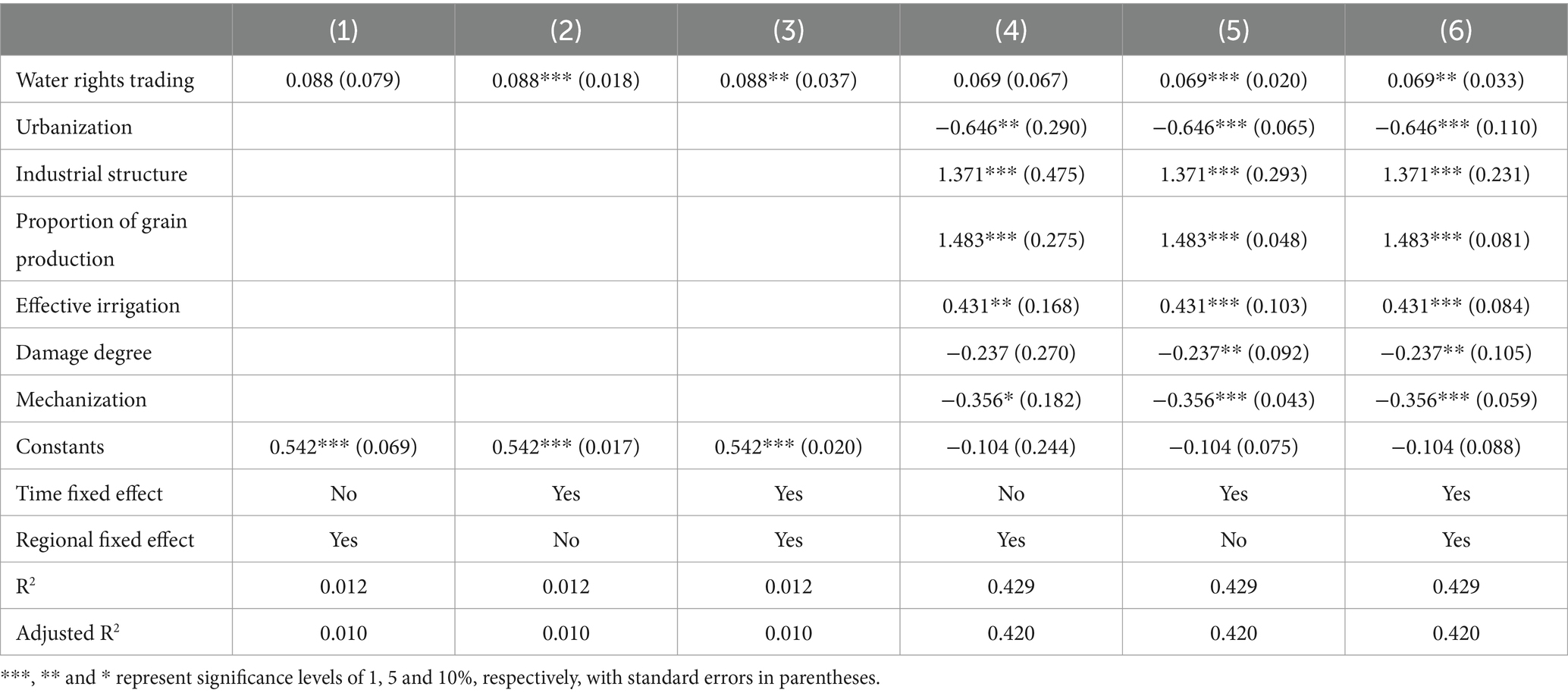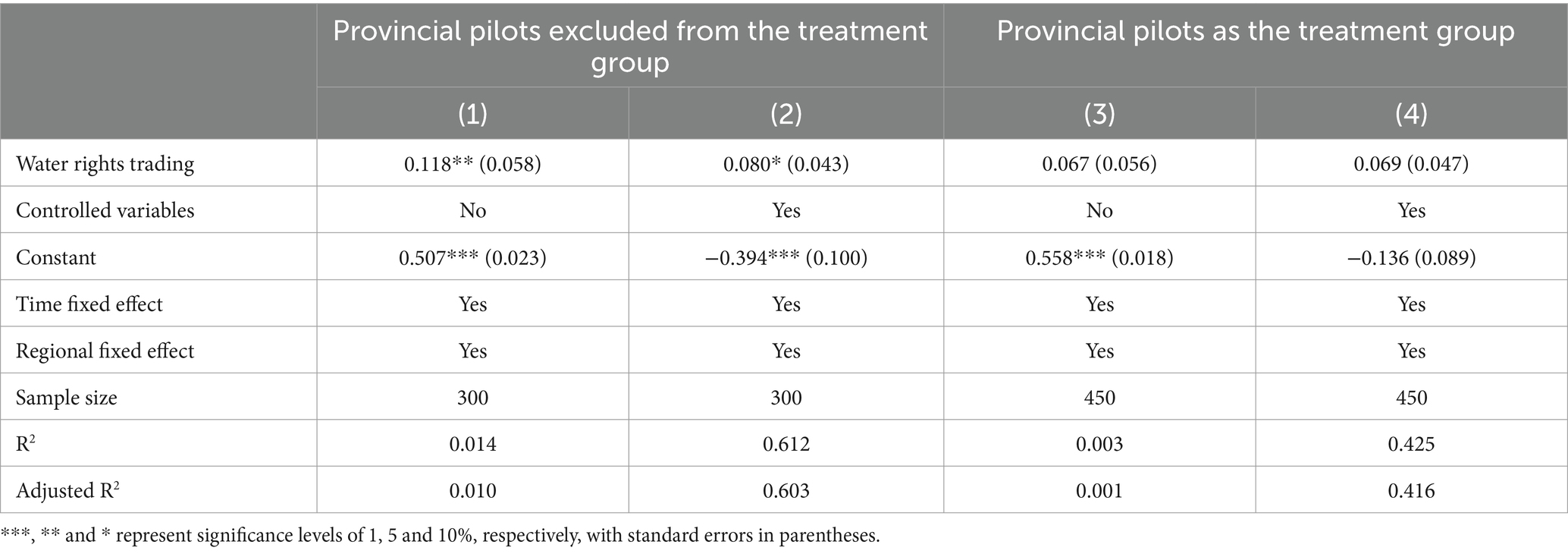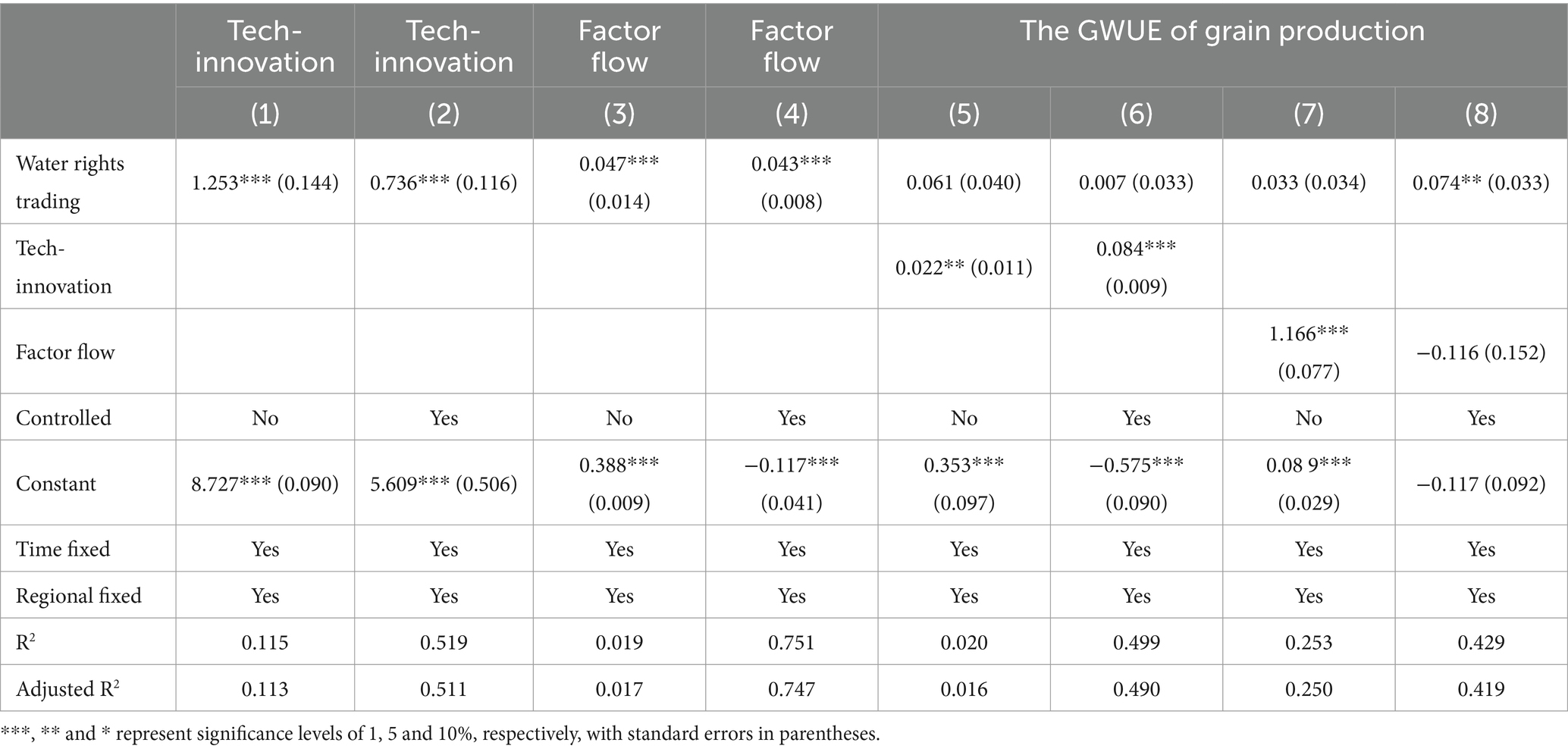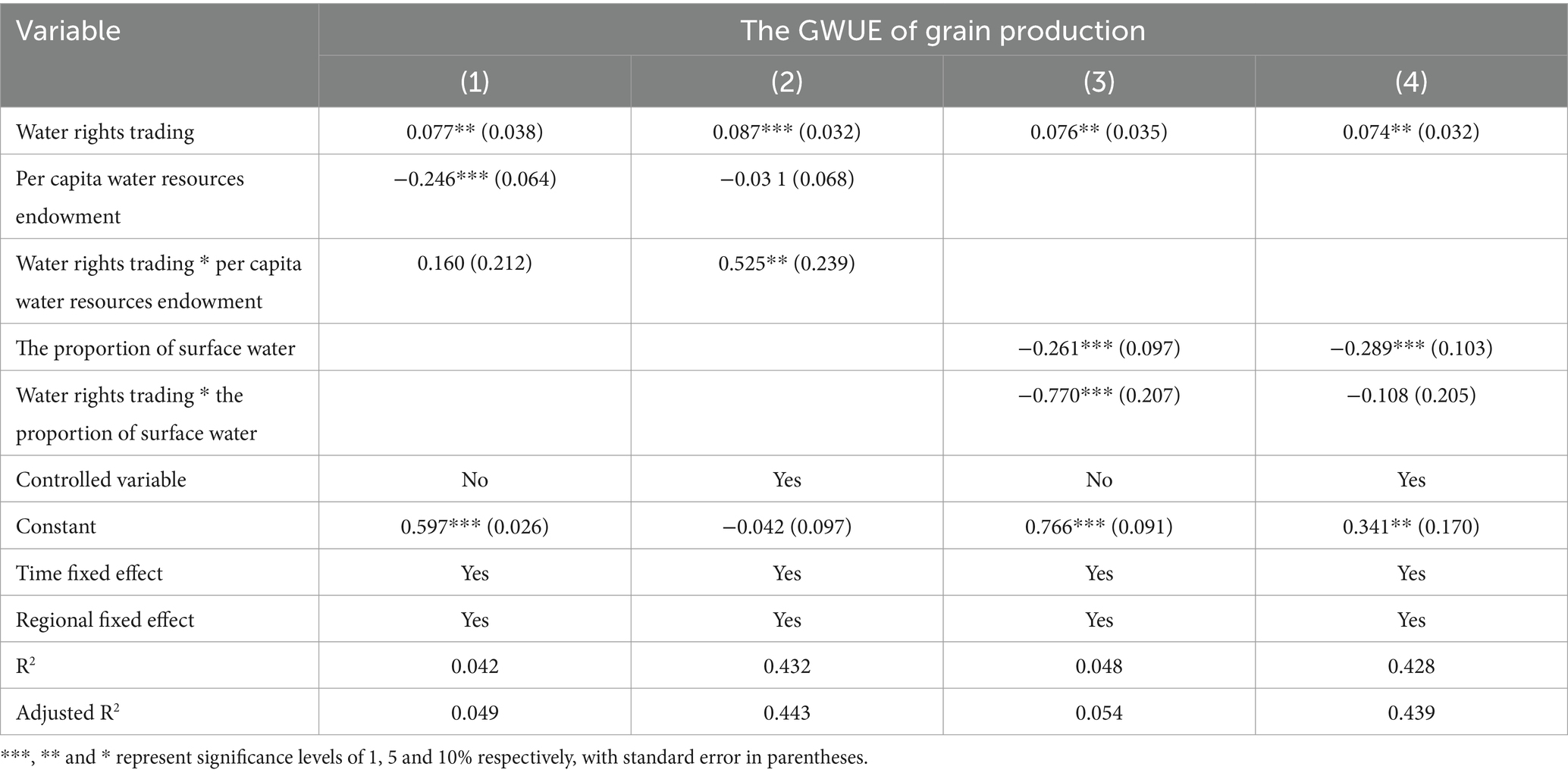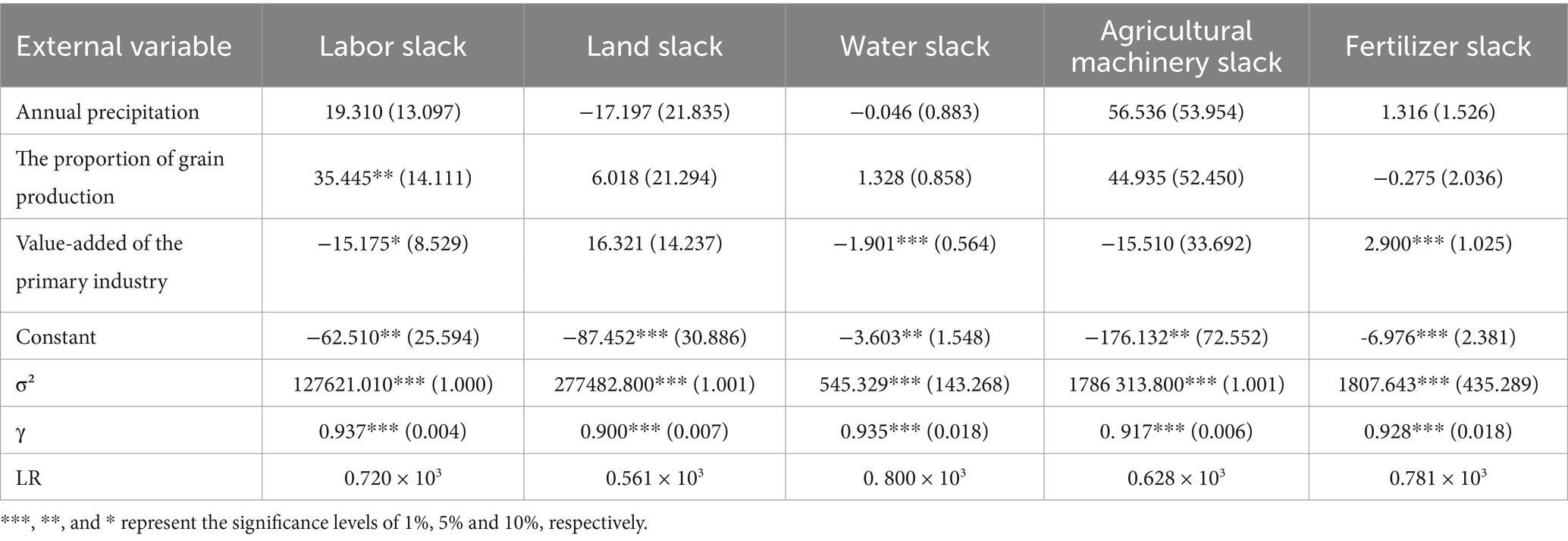- 1College of Economics, Hunan Agricultural University, Changsha, China
- 2Institute of Agricultural Economics and Development, Chinese Academy of Agricultural Sciences, Beijing, China
Introduction: Since water is an essential input in agricultural production, the reform of water rights system can pose significant influence on water resource allocation and utilization within agri-food systems. Water rights trading has been recognized as an innovative market incentive strategy to promote sustainable water use. This study investigates the role of China’s water rights trading policy played in promoting the green water use efficiency of grain production.
Methods: A three-stage DEA method is adopted to evaluate the green water use efficiency with a provincial panel data from 2006 to 2020. A PSM-DID model, based on the quasi-natural experiment of China’s water rights trading pilots in 2014, is employed to analyze policy effects and to explore the role of market mechanism.
Results: Results have shown that the green water use efficiency of grain production has been significantly improved after the implementation of China’s water rights trading policy, and technological innovation is found to exert a mediating effect. The policy effect appears more pronounced and robust in national water rights trading pilots than in provincial ones. Heterogeneity is also detected from the perspective of water resource endowment. The efficiency improvement effect is more pronounced in areas with higher per capita water endowment or in China’s main grain-selling areas.
Discussion: The findings reveal benefits of utilizing market mechanisms to improve the water use efficiency considering environmental constraints. This study gives reference for regions aiming to implement resource conservation and environmentally friendly policies, and also provides inspiration for fostering the sustainable development of grain production in developing countries facing resource scarcity.
1 Introduction
According to a report published by the United Nations Educational, Scientific and Cultural Organization (2024), the process of achieving the Sustainable Development Goal 6 (SDG-6) appears to be off track. The utilization of water resource is becoming increasingly unsafe and unpredictable, with deteriorating water quality and greater water pressure due to climate change. In Asia-Pacific region, agricultural production of less developed countries have been significantly affected by water-related extreme events, such as floods and droughts, which hinders the process of SDG-2.
Water shortage has always been a concerned problem in China, particularly concerning agricultural grain production. By the end of 2023, China’s water resources per capita amounted to 1828.97 m3, less than 1/3 of the world’s average. Meanwhile, agricultural water use accounted for 62.20% of China’s water consumption [Ministry of Water Resources of the Peoples’s Republic of China (MWR), 2024]. With the expansion of irrigated areas and the steady growth of total grain output, the conflict between water resource scarcity and the increasing demand for irrigation has become more prominent. The net water consumption per unit of grain output is only 0.36 m3/kg and the irrigation water consumption per unit of cultivated land is 546 m3/ha. The Chinese government has implemented series of policies to develop water-saving agriculture. Although the effective utilization coefficient of farmland irrigation water has risen from 0.52 in 2012 to 0.58 in 2023, it remains below the global average level of 0.7–0.8. There is still considerable potential for further conservation in agricultural water use.
Water pollution has exacerbated the shortage. According to the results from national pollution source censuses in the first and second round, crop production and livestock farming are the primary sources of agricultural non-point source pollution (An et al., 2024). Non-point source pollution, including the excessive application of chemical fertilizer and the disposal of non-degradable agricultural film in grain production, intensifies the eutrophication and solid waste pollution of water bodies (Kumar et al., 2023; Yu et al., 2024). Excessive amounts of nitrogen, phosphorus, heavy metals and other pollutants enter the water bodies, which not only hinders the effective utilization of water resources but also affects food safety (Bhat et al., 2024; Deng et al., 2024). In this sense, agricultural water use must develop towards both efficient and green to guarantee food security.
China has been committed to adhering to the policy of resource conservation and environmental protection, and encouraging innovative practices. In 2014, China has launched water rights trading pilot work in 7 provinces (Ningxia, Hubei, Jiangxi, Inner Mongolia, Guangdong, Gansu and Henan), encompassing water rights registration, trading platform construction and water management system design. The pilot work signifies a shift from government-lead water resource management to a co-dominance of the government and market forces in China. The literature on water markets has a long history, but it wasn’t until the early 21st century that a distinct branch of literature with water rights trading at its core emerged. Initially, research primarily focused on theoretical analysis and practical experience summaries (Pigram, 1993). In recent years, qualitative and quantitative studies on the implementation effect of water rights trading policies have been proliferating (Grafton et al., 2016; Iftekhar and Fogarty, 2022; Yang et al., 2024). It is noteworthy that scholars have not reached a consensus on whether water rights trading can improve the efficiency of water resources. The establishment of water rights trading system can compensate for the limitations of administrative management by leveraging the market mechanism. The market price mechanism and market competition are believed to stimulate water-saving behavior and promote the circulation of water rights, thereby enhancing the efficiency of resource utilization and allocation (Wang et al., 2022; Tian et al., 2022). Pan et al. (2023) concluded that the water rights trading policy was not conducive to improving water utilization efficiency in provincial border cities, using prefecture-level city samples. Fei et al. (2021) found that the water rights trading mechanism led to a rebound in agricultural water use, which was not beneficial for agricultural water use efficiency increase.
However, most studies concentrate on the impacts of water rights trading among industries or regions (Du et al., 2022; Yang et al., 2024), while the policy effect evaluation from the perspective of agricultural water is still insufficient. The few existing studies focusing on agricultural water use efficiency (Zhang et al., 2021a, 2021b; Xu et al., 2023) do not place the research context within grain production, which is the largest water user in agriculture production. Therefore, this study focuses on agricultural water use in grain production, and empirically analyzes the policy effects of water rights trading on the green water use efficiency (GWUE). A three-stage DEA method is adopted to evaluate the GWUE, considering environmental constraints of water resources. Using this unexpected output model can help to investigate the indirect effect of water rights trading policy on resources utilization and the ecological system. Besides, a PSM-DID model, based on the quasi-natural experiment of China’s water rights trading pilots in 2014, is employed to analyze the policy effect. Using this model helps to clarify the role of market mechanism in the allocation of natural resources. In general, this study gives reference for regions aiming to implement resource conservation and environmentally friendly policies. It also provides inspiration for fostering the sustainable development of grain production in developing countries facing resource scarcity.
2 Theoretical framework
2.1 Water rights trading system
The utilization of market mechanisms and economic instruments has been internationally recognized as a significant approach to enhance water use efficiency. As early as the 1980s, countries such as Chile, the United States, and Mexico began to establish water rights trading markets. At the start of the 21st century, China began to explore the construction of water rights trading system. The practice and exploration during China’s nascent stage of water rights trading demonstrated that agricultural participants possessed both water conservation potential and enthusiasm that could be spurred by institutional innovation. In 2000, the first trading in Dongyang city and Yiwu city of Zhejiang province marked the beginning of water rights trading practice in China. In 2002, farmers in Honghe Irrigation District in Zhangye City, Gansu Province attempted to exchange water tickets. In 2003, water rights for the Yellow River in Inner Mongolia and Ningxia was transferred from agricultural to industrial sector. In 2005, Yidu city in Hubei Province initiated the reform of the “property right beneficiary ownership system” for small rural water conservancy facilities. In 2014, China officially launched the water rights transaction. Pilot projects were conducted in Ningxia, Hubei, Jiangxi, Inner Mongolia, Guangdong, Gansu and Henan provinces, taking into account preliminary work experience, regional differences and representativeness. After 2014, the pilot areas established a contact guidance mechanism with and the Ministry of Water Resources, guaranteed with professionals and funding supports. Explorations continued in water approval registration, water rights transfer and system construction. In 2016, the national water rights trading platform was established and the Yellow River Basin water rights trading platform was officially established in 2023. According to data from the National Water Rights Trading System, the end of 2023, the number of water rights trading orders had exceeded 10,000 and the volume of water traded had surpassed 4,000 million m3. Following the national pilot program, 10 provinces (Xinjiang, Hebei, Shandong, Shanxi, Zhejiang, Shaanxi, Fujian, Liaoning, Jilin and Hunan) have launched province-level pilot projects for water rights reform. Relevant documents on water rights trading in China are sorted out in Table 1.
2.2 Theoretical analysis
The Water Law of the Peoples Republic of China stipulates that water resources are owned by the state. According to the Interim Measures for the Management of Water Rights Trading, water rights trading is defined as that ‘on the basis of reasonably defining and distributing the right to use water resources, water rights are transferred between regions, basins, industries and water users through market mechanism.’ The confirmation and registration of water rights, water rights trading and the construction of water rights trading market are the three kernel components of the pilot projects, which can be regarded as the policy treatment of the quasi-natural experiment of water rights trading pilot. Therefore, the theoretical analysis is unfolded from the following three aspects, respectively.
2.2.1 The resource-protection effect of water rights confirmation
As a typical form of public resource, water resource can also run against the market failure such as ‘the tragedy of the Commons’ during allocation. According to the property right theories in the institutional economics, institutions are endogenous variables that determine the efficiency of economic operation. The clear definition of property rights can effectively mitigate the externalities and correct the market failure of public resource allocation, so as to improve social welfare (Coase, 2013). Therefore, It is a prerequisite for water rights transaction to clearly delimit the right to use water resources and conduct standardized confirmation registration. This system strengthens the exclusivity of water resources and highlights their economic value through market mechanism. Once farmers and organizations recognize the importance and value of water resources, it is cogent to advocate for farmers’ or regional pollution prevention. Studies have proved that building a clear and effectively protected property rights system is essential to encourage individuals to engage in productive activities and foster economic growth. There is a significant positive relationship between farmland right confirmation and farmers’ investment in the quality protection of cultivated land and green production (Qian et al., 2021; Zhou et al., 2023). This demonstrates that the effective delimitation and protection of property rights can stimulate the resource protection behaviors.
2.2.2 The water-saving effect of water rights trading
Even if the property rights are determined, there are various manifestations to express rules of competitive property rights. The price mechanism is one of the efficient ways to compete property rights. According to the theory of transaction cost in the institutional economics, one of the kernel goals of economic activities is to reduce the transaction cost. The direct impact of water rights trading on agricultural water use is reflected in the rising opportunity cost of increasing water use. To make the hidden cost of irrigation water explicit can promote water-saving in grain production. Studies have indicated that the low price of irrigation water is a significant contributor to water waste (Webber et al., 2008). The implementation of the water rights trading system has increased the opportunity cost of irrigation water, which has a similar effect to raising water price. Farmers constrained by costs will choose to improve their management mode of water use for grain production and reduce excessive water use. Conversely, water-saving farmers can increase their income through water rights trading. The continuous inefficient water use equals to the loss of potential income from water rights trading, which also encourages farmers to save water. In addition to changing water use habits and irrigation patterns, water rights trading can improve irrigation water efficiency by encouraging farmers to adopt water-saving technologies. Ma et al. (2022) found that the confirmation of water rights leads to increasing irrigation opportunity cost and guides farmers’ adoption of water-saving technologies, such as sprinkler and drip irrigation, to reduce the unit water consumption rate of grain output. Green agricultural technologies, such as the integration of water and fertilizer, not only help to save water, but also effectively promote the reduction of chemical fertilizers and pesticides use. Thus, water rights trading may improve the green efficiency of water use in grain production by raising irrigation opportunity cost and stimulating farmers’ adoption of green technologies. In this sense, the following hypothesis is put forward.
H1: the implementation of water rights trading can promote the green water use efficiency of grain production.
2.2.3 The promoting effect on technological innovation and factor flow
According to the induced innovation theory, disparities in the relative price of factors lead to the emergence of technological progress in different fields, thus affecting the direction of technological advancement and the path of agricultural development (Ruttan, 1977). As the transaction price reflects economic values of water resources within market mechanism, water rights trading market can shape the direction of technological progress by altering the relative price of water and other input factors. Specifically, water rights trading increases the opportunity cost of irrigation water and changes the relative price of grain production inputs, thus encouraging water-saving technology innovation in agricultural production (Fang and Zhang, 2020). In terms of the facilitating effect of factor flow, the transaction cost can be reduced by clarifying the relevant property rights of water resources. This enables water users with higher marginal benefits to secure their desired amount of water, thereby promoting the rational allocation of water resources (Yang et al., 2024). Consequently, water resources flow from agricultural operators with low marginal utility to those with high, achieving a Pareto improvement through optimized resource allocation.
H2: the implementation of water rights trading can promote the green water use efficiency by the mediating effects of technological innovation and factor flow.
3 Materials and methods
3.1 Model specification
3.1.1 The three-stage DEA model
The three-stage DEA model was selected to measure the GWUE of grain production, while the isomeric pollution load computing method (Chen and Xu, 2023; Ji and Jiang, 2024) was used to measure the unexpected output. The three-stage DEA model, originally proposed by Fried et al. (1999), posits that the efficiency loss is caused by random disturbance items, ineffective management and external factors. When influences of random disturbance and external factors eliminated, the measured management efficiency becomes more accurate.
In the first stage, the efficiency values and the slack values are calculated by using the ultra-efficiency mixed distance function including the unexpected output, see Equation (1).
where Fi denotes the GWUE of grain production of the ith decision unit; x, y and e represent the input variable, expected output variable and undesired output variable respectively; s−, s+ and se- are the slack values while w−, w+ and we- are the weights of x, y and e, respectively; λ− and λ+ show the importance of the non-radial part of the undesired output index; θ and γ represent the input and output radial components.
In the second stage, the SFA method is used to analyze the slack value, and then the influence of external factors and random disturbance on the slack is excluded, so as to calculate the adjusted value of S under the same external condition and random disturbance, see Equation (2).
where Sjit represents the slack value of jth kind of input of ith decision-making unit in the investigation period t; Zit is a set of external variables affecting and βjt is the under-valuation coefficient of Zit. Besides, vjit denotes a random disturbance term and follows a normal distribution, ujit is a management inefficient term, assumed to obey a semi-normal distribution.
After eliminating influences of external factors and random disturbance terms, all decision units are adjusted to the same external environment, and the adjusted input items become , see Equation (3).
where Xjit represents the input data of each decision unit before the adjustment; indicates the amount of input that each decision unit needs to adjust to realize the same external condition; vijt denotes the amount of input that each decision unit needs to adjust for the same random disturbance condition. In the third stage, estimating the GWUE again, using the adjusted inputs with the same external conditions and random disturbance as in the second stage.
3.1.2 The PSM-DID model
A PSM-DID model is the combination of propensity score matching and difference-in-difference method, accounting for both the sample selectivity bias and self-selection bias to address endogeneity issues. This model is frequently used for the quantitative evaluation of public policies and project implementation outcomes. Specifically, the water rights trading pilot implemented in 2014 is regarded as a quasi-natural experiment, enabling an effective analysis of net impacts of policy implementation across various provinces. The pilot areas were designated as the experimental group, while other provinces and regions serving as the control group. The construction of the model is presented as follows (Equation 4):
where i denotes the ith province (city, autonomous region) and t represents the time; effit is the GWUE of grain production calculated by DEA method; timei represents the time dummy variable, where the value is 1 at t = 2014, otherwise the value is 0; treatedi represents the dummy variable of the region, where the value equals 1 if the province is a pilot area of water rights trading; μi shows the regional fixed effect; ηt denotes the time-fixed effect; and εit is a random error term. α0, α1 and α2 represent a fixed intercept term, the policy effect of water rights trading and the coefficient of the control variable, respectively.
3.1.3 The mediating effect model
Based on the above theoretical analysis, in order to verify the mediation effect of water rights trading mechanism, the mediating effect model is constructed by stepwise regression method as follows (Equations 5–7):
where Mit represents the intermediary variable, selecting the technical improvement variable and the factor flow variable among industries; α0, β0, γ0 represents the fixed intercept term in each type; α1 ~ α2, β1 ~ β2, γ1 ~ γ3 represent the regression coefficients in each category, respectively.
3.2 Data sources and variable selection
Subjected to data availability, the study samples were selected from 30 provinces in China (excluding Hong Kong, Macao, Taiwan, and Tibet). As the Ministry of Water Resources issued the Notice on Water Right Pilot Work in 2014, setting 2014 as the policy time point in the model constitutes a quasi-natural experiment. In order to observe changes before and after the policy implementation and to capture long-term policy effects, the time span is set from 2006 to 2020. The data for each variable primarily originated from the China Statistical Yearbook, China Environmental Statistical Yearbook, China Rural Statistical Yearbook and China Water Resources Bulletin. For any missing data, the statistical yearbooks of each province were consulted.
3.2.1 Dependent variable
The input–output indicators of three-stage DEA model to measure the GWUE are displayed in Table 2. The load of chemical fertilizer pollution and solid waste are taken as the undesired output variables in grain production. The GWUE, considering undesired output, is corrected to avoid exaggerating or underestimated the impact of water rights trading on the efficiency of food production.
3.2.2 Independent variables
The core explanatory variable is treatedi*timei, indicating whether the pilot water rights trading is carried out in the region. The pilot water rights trading is regarded as a quasi-natural experiment, where provinces with national and provincial pilot are regarded as treatment group, and non-pilot provinces belong to the control group. Specifically, seven provinces conducting the national water rights trade are Inner Mongolia, Jiangxi, Henan, Hubei, Guangdong, Gansu and Ningxia; while 10 provinces conducting the provincial water rights trade are Xinjiang, Hebei, Shandong, Shanxi, Zhejiang, Shaanxi, Fujian, Liaoning, Jilin and Hunan.
The descriptive analysis of intermediary and control variables selected is presented in Table 3. Previous studies have demonstrated that agricultural production efficiency is influenced by the level of urbanization development, the regional economic development level and its industrial institutions (Li et al., 2022; Chang et al., 2023). The technical efficiency of grain production is associated with the proportion of regional grain production, the irrigation conditions, mechanization conditions and other factors (Zhang et al., 2021a, 2021b). Technological innovation and factor flow are selected as intermediary variables. Technological innovation is measured by the number of utility model patents. Compared with the total amount of patents granted as referenced in existing literature, the amount of utility model patents more accurately reflects the improvement of actual water use through technological innovation. The proportion of agricultural water consumption within the total water consumption is utilized to measure the inter-industry flow of factors.
4 Results and discussion
4.1 The estimation of the three-stage DEA model
4.1.1 Spatio distribution of the green water use efficiency of grain production
The GWUE of grain production before and after 2014 were calculated using MatlabR2022a software. Estimation results of the DEA model at both the first and third stage were demonstrated from a comparative perspective (Table 4). Column (1) and (2) displayed results from the first stage, while column (3) and (4) showed efficiency values from the third stage. Results of the SFA regression in the second stage can be found in the Appendix.
Generally, the mean efficiency value decreases from 0.7 at the third stage to 0.5 at the third stage, which proves the existence of influences posed by external factors and random error on efficiency. A more accurate green water use efficiency is obtained using the three-stage DEA model. For most provinces, the GWUE and ranks at the first stage keep accordance with those at the third stage, verifying the robustness of results. Exceptions are Chongqing and Shanghai, two municipalities under direct controls of central government. Reasons are that external factors in the two municipalities pose strong influences, resulting in the variance of efficiency values at the first and the third stage of DEA model. Cao et al. (2023) have also found that the regional economic development level has a significant impact on the GWUE. Besides, the function of grain production in the four municipalities, Beijing, Shanghai, Tianjin and Chongqing, is far from obtaining the outputs because agriculture is organized in different patterns and modernized agriculture takes a large share. In this light, more attention should be paid to the main grain production area of China, including 13 provinces, Heilongjiang, Henan, Shandong, Sichuan, Jiangsu, Hebei, Jilin, Anhui, Hunan, Hubei, Inner Mongolia, Jiangxi and Liaoning. The GWUE of these 13 provinces rank in the first half of the sampled 30 provinces. Therefore, a heterogeneity analysis is conducted in this study, concentrating on the policy effects of water rights trading in different grain production functional areas.
Besides, the GWUEs of provinces in the northern part of China are averagely ranked higher than those in the southern part, indicating that GWUEs have regional differences. On the premise of considering environmental factors, there are 15 provinces obtaining efficiency values lower than the national average level and with great water saving potential, including Guizhou, Yunnan, Shanxi, Guangxi, Shaanxi, Guangdong, Gansu etc. Most of these provinces are located in the southern part of China with better water endowment. A lack of perceptions of water scarcity, weak management of water resources and less promotion of water-saving measurements may be the reason. There are 8 provinces obtaining a GWUE of grain production greater than 1, including Inner Mongolia, Heilongjiang, Henan, Jilin, Shandong, Jiangsu, Sichuan and Hunan.
Results are further summed up from a comparing perspective of the changing range and ranking of the GWUE before and after water rights trading implementation (Table 5). Generally, water rights trading pilot areas have a better performance in improving the GWUE of grain production, which preliminary confirms the research hypothesis (H1) of this study. The efficiency values of 13 provinces are significantly improved after the implementation of water rights trading, including 5 national pilot areas, 5 provincial pilot areas and 3 non-pilot areas. Although efficiency values of national and provincial pilot areas decreased, the positive effect of water rights trading on efficiency can still be revealed. There are 3 of the 7 national-level pilot provinces still increase their efficiency after water rights trading market establishment, and 4 of the 10 provincial-level pilot areas likewise.
4.1.2 Dynamic analysis of the green water use efficiency of grain production using Malmquist index
The Malmquist index model is used to further capture the dynamic changes of GWUEs (Figure 1), decomposed into technical efficiency and technological progress, among which the technical efficiency can be further decomposed into net technical efficiency and scale efficiency. It is found that the GWUE of China’s grain production is on the rise, with an average annual growth rate of 5.02%. Indicators fluctuated greatly before the implementation of water rights trading and became relatively flat after 2014. It is worth noting that the net technical efficiency change index has always been greater than 1 since 2014 and showed an overall upward trend. The change of net technical efficiency is mainly related to the water management level, referring to the implementation of comprehensive agricultural water price reform in China and the orderly establishment of water rights trading mechanism since 2014.
4.2 Policy effects of water rights trading
4.2.1 Propensity score matching results and parallel trend test
Considering the matching effect, the pair of two-caliper nearest neighbor matching method is selected. A year-by-year matching method was adopted to find a matched control group for the treatment group in each year in 2014–2020. The nuclear density before and after matching is shown in Figure 2. It is easy to conclude that the matching effect is acceptable because the propensity score of both treatment group and control group have improved in the values and distribution after matching. The time trend chart of the treatment group and the control group after matching the propensity score is presented in Figure 3. Basically, the efficiency trend of both treatment group and control group changed before the start of the water rights trading pilot. The policy dynamic effect diagram (Figure 4) passes the parallel trend test. To sum up, the matched data basically meet the parallel trend requirements.
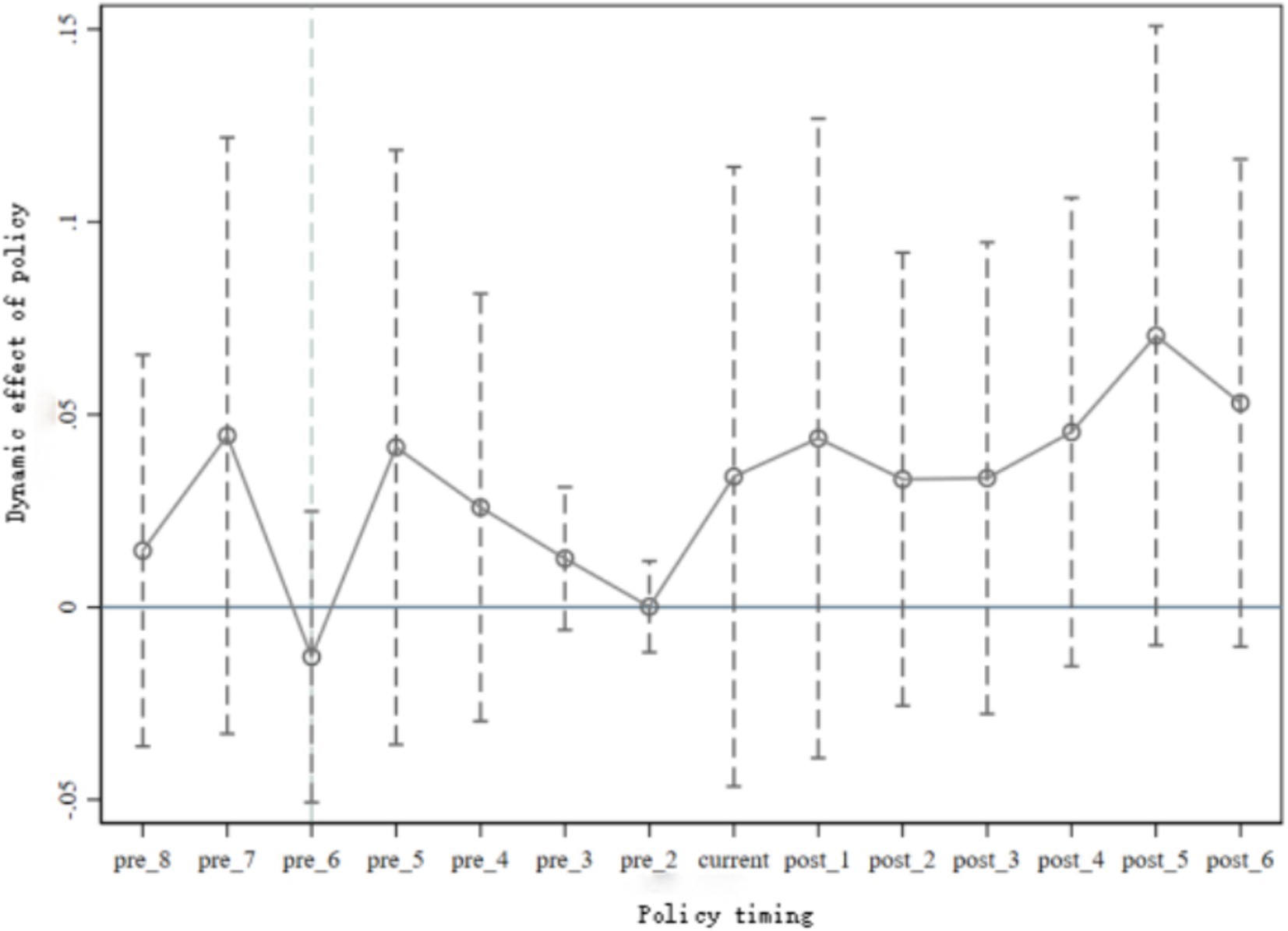
Figure 4. Confidence interval plot. Pre_ * and post_ * is the year before and after the policy implementation, respectively; the short-dotted line shows the confidence interval.
4.2.2 Benchmark regression results
The hypothesis H1 has been verified that the GWUE of grain production has significantly improved in the pilot provinces of water rights trading (Table 6). Results are still robust after adding control variables and with the simultaneous fixation of time and region. This result is in line with the view of scholars that the implementation of water rights trading mechanism can promote the efficiency of water use and agricultural water resources allocation (Wang et al., 2023; Gao et al., 2024). This reveals that policies of water right registration, water right trading and system construction implemented have significant influences on improving the quality and efficiency of grain production. Reasons may be that it increases the welfare of water rights trading participants through market tools, rationally distribution of scarce water resources, and improvements of water use efficiency (Shi et al., 2022).
The implementation of water rights trading can also help to realize the goal of the ‘dual control’ policy in China, which requires strict control over the total amount and intensity of water use. On one hand, water rights trading system breaks down the total water consumption to regional, industrial and user levels. This lays a foundation for the control of total water consumption. On the other hand, the water use intensity of the northern part in China can be alleviated through the balance of the uneven distribution of water resources among regions. The Chinese government has invested in a ‘South-to-North Water Diversion Project’ to alleviate the water shortage problem in the north through water transfer across river basins. However, the water-receiving areas often prefer local water sources, such as groundwater, due to the high cost of transferring water from outside. Water trading rights system provides a market-based tool to solve the problem, promoting the same quality and price for different water sources. Therefore, the optimal allocation and conservation of water resources are achieved under the joint effects of water use policies in China.
In addition, the GWUE of grain production in model (6) is positively affected by the industrial structure, grain production area proportion and effective irrigation degree. This result is consistent with Pan et al. (2023). Good irrigation conditions in major grain-producing areas, investment in water-saving and conservancy infrastructure are conducive to the improvement of agricultural water use efficiency. The coefficient of urbanization and mechanization degree is significantly and negatively connected with the GWUE of grain production, indicating that there is redundancy in grain irrigation water input. Literature has also found a certain coupling relationship between agricultural modernization and urbanization (Jiang and Yan, 2021). The negative coefficient of mechanization degree may be due to the substitution relationship between agricultural mechanization and water saving irrigation. For example, mechanized operations such as land leveling and deep plough enhance the capacity of soil water storage and water retention, and thus increasing the water demand of soil in the current season.
4.2.3 Robustness tests
Results of robustness check are shown in Table 7. In model (1) and (2), results are significant after excluding the provincial water right pilots in the treatment group, indicating that the pilot work of water rights trading policy has significantly improved the GWUE of grain production. Results are still stable in the quasi-natural experiment of national pilots. However, estimates in Model (3) and (4) are not significant with the provincial water rights trading pilots. The reason may be that the policy implementation practices in each pilot province has large disparity. For example, the implementation mode and time-line are not unified. So the effects of the provincial water rights trading are hardly to be captured. Generally, it can be inferred that the effect of national pilots trading on the GWUE is more significant than that of provincial pilots. Some scholars have also reached similar findings that the effect of water rights trading is more obvious in national pilots (Gao et al., 2024). Possible reasona may be that national pilots have received more attention and support in policy implementation, having established guidance and contact relationship with the Ministry of Water Resources. Also, most national pilot projects have initiated water rights trading attempts in the earlier period and have richer experience in this exploration.
A placebo test is used to further test the effect of unobservable features (Figure 5). Randomly generating a list of pilot areas for water rights trading, creating a false estimate . This process is repeated 500 times to produce 500 false . The distribution of is depicted (Figure 5A) and follows a normal distribution with only four sampling coefficients located to the right of the benchmark regression coefficient. The distribution of t-values is depicted in Figure 5B and only six t-values locate to the right of the benchmark regression t-values. In conclusion, the randomly generated false estimates were not significant, passing the placebo test.

Figure 5. Distribution of estimators and T-values in the placebo test. (A) The captures the distribution of estimators, and (B) the depicts the distribution of T-values of the placebo test.
4.3 Mediating effects of tech-innovation and factor flow
The estimated results for the mediating effects model are shown in Table 8. The coefficient of technological innovation is significantly positive in model (1) and (2), indicating that the implementation of water right trading has a significant positive promotion effect on tech-innovation, which is in line with the finding of Fang and Zhang (2020). After joining the tech-innovation intermediary variable, the positive relationship between water rights trading system and the GWUE is no longer significant, implying that tech-innovation can work as a mediator (model 5 and 6). The hypothesis H2 is verified that the water rights trading mechanism promotes the GWUE of grain production through tech-innovation. According to the theory of induced agricultural technology innovation, water rights trading changes the relative price of input factors in agricultural production, thus inducing the innovation and adoption of water-saving technology. Mu et al. (2022) have also found that promoting technological innovation is one of the paths for water right trading to play a water-saving effect.
Results of model (3) and (4) prove that water rights trading can promote the flow of water resource factor. The existing researches have fully demonstrated that the factor flow can promote the efficiency of water resources utilization (Fang and Zhang, 2020; Zhang et al., 2021a, 2021b). But based on the strict three-step method of mediation effect model (Table 8, model 7 and 8), the coefficient of factor flow intermediary variable is not significant when control variables added. It indicates that the path of water rights trading mechanism to promote GWUE through factor flow is not robust. Reasons may be that the mediating effect model uses water flow between industries as proxy variables due to data availability, namely the index of agricultural water consumption proportion, which should have been the water consumption proportion of grain production.
4.4 Heterogeneity analysis
Differentiated factors such as resource endowment, surface water resource proportion and the proportion of grain production area are necessary to be considered when evaluating water-saving effect of water right trading, since traces have been found in the descriptive analysis of the GWUE of grain production. The heterogeneity analysis can be realized by a triple difference model (DDD) with results shown in Table 9.
1. Per capita water resources endowment. An interaction term of per capita water resources and the core explanatory variable treatedi*timei is added into the benchmark regression model to estimate heterogeneous impacts of water resource endowment. Results (Table 9, model 1 and 2) show that the coefficient of interaction term increased to 0.525 and is significant at the level of 1%, indicating that the influence of water rights trading on the GWUE is enforced in areas with high per capita water endowment. Reasons may be that areas with higher per capita water endowment have more tradable water rights and are more incentive to save water. The increase of income brought by water rights trading poses a stronger shock for farmer’s water protection behavior and for the region to improve water resources utilization efficiency. Other studies also found that the water-saving effect of water rights trading was more significant in areas with high water demand and more tradable water resources. For example, the previous study of Zhang et al. (2021a, 2021b) found that areas with better water resources endowment are often easier to achieve agricultural water saving and improve the water efficiency of agricultural production. In addition, the ‘South-to-North Water Diversion Project’ balances the uneven distribution of water resources through engineering technology, while the water rights trading system provides market-based tools as a strong supplement. As discussed before, the GWUEs of provinces in the northern part of China are averagely ranked higher than those in the southern part. Market mechanism may play a better role in water allocation and utilization in the southern part.
2. The structure of water resource endowment. The total flow rate of water resources is composed of surface and ground water resources. Due to regional differences in water resource endowment, surface and ground water resources for grain production have also exhibited great discrepancy. Therefore, the proportion of surface water resources was selected to measure the structure of water resources, and its interaction term with the core explanatory variable treatedi*timei was added into the benchmark regression model. As shown in the results of model (3) and model (4) in Table 9, the coefficient of interaction term turns insignificant after adding control variables. The improvement effect of water right trading on GWUE of grain production does not show significant differences in areas with abundant surface water resource.
3. Layout of grain production. As discussed, the proportion of grain production plays an impact on the GWUE of the decision-making unit. Therefore, it is necessary to estimate the regression model according to the food production layout to explore the differentiated effects of food functional regions. Results show that (Table 10), the policy effect of water rights trading in the main grain-selling area is significant. Reasons may be that the implementation of water rights trading in these areas can more effectively stimulate the innovation and application of water-saving technology and improve the efficiency of water resources utilization. In addition, the coefficient of water rights trading in the balanced area is significantly negative, where there may exist biased sampling. The national or provincial pilots are mainly concentrated in the main producing areas and main sales areas. Also, large variance of the GWUE value of grain production exists in the balanced area. So, the negative coefficient of water rights trading does not necessarily mean a negative effect of water rights trading in the balanced region. Conversely, the validity of this conclusion should be discussed after the establishment of more pilots in balanced areas or using county data, which is also a limitation of this study.
5 Conclusion and ways forward
In 2014, China has launched water rights trading pilot work in 7 provinces, which signifies a shift of water resource management from government-lead to a co-dominance of the government and market forces in China. Treating this as a quasi-natural experiment, this study empirically analyzes the role of China’s water rights trading policy played in promoting the GWUE of grain production, using a three-stage DEA method and a PSM-DID model.
To conclude, the green water use efficiency of grain production has been significantly improved after the implementation of China’s water rights trading policy. The policy effect appears more pronounced and robust in national water rights trading pilots than in provincial ones. Heterogeneity is also detected from the perspective of water resource endowment. The efficiency improvement effect is more prominent in areas with higher per capita water endowment or in China’s main grain-selling areas. Besides, transactions of water rights help to foster the technological innovation and thus promoting green and efficient water use.
These findings reveal benefits of utilizing market mechanisms to improve the water use efficiency while considering environmental constraints, and thus provide inspiration for fostering the sustainable grain production in developing countries facing resource scarcity. Both the engineering and market-based measurements are necessary to control the total consumption of water in agricultural production and to balance the water use demand across regions, industries and users. Different measurements may come into play under disparate contexts. According to the characteristics of resource endowment, each region can explore the water right confirmation and transaction modes adapting to local conditions. Also, to motivate the innovation and adoption of ‘green’ technology, such as water-saving technologies, is also indispensable, since it exhibits a mediating effect.
Moreover, references are given for regions planning to formulating resource conservation and environmentally friendly policies, or aiming to carry out water management reforms. It is suggested initially to accelerate the confirmation of water rights and legal protection and to establish a price system reflecting the scarcity of water resources and ecological costs. For example, the ownership of water rights is still ambiguous in some area of China, and the trading prices of water rights are generally low, which is difficult to reflect the scarcity of water resources and weakens the regulatory role of the market. Secondly, the incentive mechanism for water rights trading, particularly for irrigation water users, should be established and improved. The volume of water transaction in China is still weak with an unstable structure of water rights transaction. For instance, water management units could participate in the repurchase of water rights from irrigation water users, which can further facilitate the factor flow. Thirdly, it is suggested to strengthen the technical support and data sharing in the management of water resources. Enhancing the data sharing capacity of the trading platform can promote the refined management and transaction transparency.
The future study can be more concentrated on policy effects within the main production areas with better county-level panel data, because the water consumption of main production areas takes a large proportion. Also, more efforts can be put in the exploration of mechanism through which water rights trading system play a part in the efficiency promotion.
Data availability statement
The original contributions presented in the study are included in the article/supplementary material, further inquiries can be directed to the corresponding author.
Author contributions
NY: Software, Data curation, Visualization, Funding acquisition, Conceptualization, Resources, Writing – original draft, Investigation, Project administration, Writing – review & editing, Validation, Formal analysis, Methodology, Supervision. SL: Methodology, Visualization, Data curation, Writing – original draft, Software. YX: Visualization, Investigation, Writing – review & editing, Funding acquisition.
Funding
The author(s) declare that financial support was received for the research and/or publication of this article. We gratefully acknowledge Natural Science Foundation of Hunan Province (2021JJ40265; 2024JJ5212).
Acknowledgments
We would like to express our gratitude to the reviewers and editors who contributed to this work. We would also give our gratitude to Prof. Zhong Yu for his valuable comments during revision.
Conflict of interest
The authors declare that the research was conducted in the absence of any commercial or financial relationships that could be construed as a potential conflict of interest.
Generative AI statement
The author(s) declare that no Gen AI was used in the creation of this manuscript.
Publisher’s note
All claims expressed in this article are solely those of the authors and do not necessarily represent those of their affiliated organizations, or those of the publisher, the editors and the reviewers. Any product that may be evaluated in this article, or claim that may be made by its manufacturer, is not guaranteed or endorsed by the publisher.
References
An, Z., Sui, L., and Liu, B. (2024). Research and prospects of non-point source pollution in China's agriculture. J. Plant Nutr. Fertil. 30, 1422–1436. doi: 10.11674/zwyf.2024215
Bhat, A., Fan, D., Nisa, U., Dar, T., Kumar, A., Sun, Q., et al. (2024). Trace elements in the upper Indus River Basin (UIRB) of Western Himalayas: quantification, sources modeling, and impacts. J. Hazard. Mater. 476:135073. doi: 10.1016/j.jhazmat.2024.135073
Cao, S., He, Z., Xu, L., Yang, Q., and Zhang, L. (2023). The influence of regional tourism development on the green efficiency of water resources and its spatial and temporal differentiation. Econ. Geogr. 43, 215–224. doi: 10.15957/j.cnki.jjdl.2023.07.021
Chang, J., Wang, W., and Liu, J. (2023). Industrial upgrading and its influence on green land use efficiency. Sci. Rep. 13:2813. doi: 10.1038/s41598-023-29928-8
Chen, J., and Xu, L. (2023). Study on utilization efficiency of green water resources in China based on panel three-stage DEA-Malmquist model. Geography Sci. 43, 709–718. doi: 10.13249/j.cnki.sgs.2023.04.014
Deng, X., Mao, L., Peng, M., Cai, Y., Wang, T., Luo, Z., et al. (2024). Polycyclic aromatic hydrocarbons in coastal rivers in Jiangsu Province, China: spatial distribution, source apportionment and human impacts. J. Hazard. Mater. 466:133576. doi: 10.1016/j.jhazmat.2024.133576
Du, M., Huang, C., and Chen, Z. (2022). Evaluating the water-saving and wastewater-reducing effects of water rights trading pilots: evidence from a quasi-natural experiment. J. Environ. Manag. 319:115706. doi: 10.1016/j.jenvman.2022.115706
Fang, L., and Zhang, L. (2020). Does the trading of water rights encourage technology improvement and agricultural water conservation? Agric. Water Manag. 233:106097. doi: 10.1016/j.agwat.2020.106097
Fei, R., Xie, M., Wei, X., and Ma, D. (2021). Has the water rights system reform restrained the water rebound effect? Empirical analysis from China's agricultural sector. Agric. Water Manag. 246:106690. doi: 10.1016/j.agwat.2020.106690
Fried, O., Schmidt, S., and Yaisawarng, S. (1999). Incorporating the operating environment into a nonparametric measure of technical efficiency. J. Prod. Anal. 12, 249–267. doi: 10.1023/A:1007800306752
Gao, D., Deng, Y., Gao, S., and Chen, C. (2024). Can China’s water rights trading system promote water resources technological innovation? Desalin. Water Treat. 317:100112. doi: 10.1016/j.dwt.2024.100112
Grafton, Q., Horne, J., and Wheeler, A. (2016). On the marketisation of water: evidence from the Murray-Darling basin, Australia. Water Resour. Manag. 30:913. doi: 10.1007/s11269-015-1199-0
Iftekhar, S., and Fogarty, J. (2022). Benefits of a groundwater allocation trading arrangement in a water-stressed environment. Agric. Water Manag. 269:107649. doi: 10.1016/j.agwat.2022.107649
Ji, X., and Jiang, J. (2024). Regional differences in non-point source pollution in China and its decoupling effects. Agric. Res. Regional. China, 45, 49–61. doi: 10.7621/cjarrp.1005-9121.20240605
Jiang, Z., and Yan, H. (2021). Coupling and coordination between new urbanization and agricultural modernization in Central China. J. Nat. Resour. 36, 702–721. doi: 10.31497/zrzyxb.20210313
Kumar, A., Kumar, V., Pandita, S., Singh, S., Bhardwaj, R., Varol, M., et al. (2023). A global meta-analysis of toxic metals in continental surface water bodies. J. Environ. Chem. Eng. 11:109964. doi: 10.1016/j.jece.2023.109964
Li, D., Shi, H., Ma, P., Zhu, S., and Xu, H. (2022). Understanding the mechanism of urbanization affect agricultural water efficiency: evidence from China. Water 14:2176. doi: 10.3390/w14142176
Ma, J., Cui, Y., and Chong, D. (2022). Credit availability, water right confirmation and agricultural water-saving technology investment—evidence based on the quasi-natural experiment of water right confirmation pilot. China’s Rural Econ. 8, 70–92.
Ministry of Water Resources of the Peoples’s Republic of China (MWR) (2024) China water resources bulletin 2023. Available online at: http://www.mwr.gov.cn/sj/tjgb/szygb/202406/t20240614_1713318.html
Mu, L., Liu, Y., and Chen, S. (2022). Alleviating water scarcity and poverty through water rights trading pilot policy: a quasi-natural experiment based approach. Sci. Total Environ. 823:153318. doi: 10.1016/j.scitotenv.2022.153318
Pan, J., Peng, J., Yang, X., and Xuan, S. (2023). Does water rights trading promote resources utilization efficiency and green growth? Evidence from China’s resources trading policy. Resour. Policy 86:104235. doi: 10.1016/j.resourpol.2023.104235
Pigram, J. J. (1993). Property rights and water markets in Australia: an evolutionary process toward institutional reform. Water Resour. Res. 29, 1313–1319. doi: 10.1029/92WR02909
Qian, L., Feng, Y., and Lu, H. (2021). The influence of land right stability on the protection of farmland quality: based on the analysis of a new round of confirmation and certification. J. Nanjing Agric. Univ. (Soc. Sci. Ed.). 21, 104–115.
Ruttan, V. W. (1977). Induced innovation and agricultural development. Food Policy 2, 196–216. doi: 10.1016/0306-9192(77)90080-X
Shi, C., Li, L., Chiu, Y., Pang, Q., and Zeng, X. (2022). Spatial differentiation of agricultural water resource utilization efficiency in the Yangtze River Economic Belt under changing environment. J. Clean. Prod. 346:131200. doi: 10.1016/j.jclepro.2022.131200
Tian, G., Zhao, Q., and Wu, Z. (2022). Water-saving effect and influence on water efficiency. Chin. Popul. Resour. Environ. 32, 193–204. doi: 10.12062/cpre.20220434
United Nations Educational, Scientific and Cultural Organization . (2024). The United Nations world water development report 2024: water for prosperity and peace. Available online at: https://unesdoc.unesco.org/ark:/48223/pf0000388948
Wang, Y., Yin, H., Guo, X., Zhang, W., and Li, Q. (2022). Distributed ANN-bi level two-stage stochastic fuzzy possibilistic programming with Bayesian model for irrigation scheduling management. J. Hydrol. 606:127435. doi: 10.1016/j.jhydrol.2022.127435
Wang, G., Zhang, X., Du, L., Lei, B., and Xu, Z. (2023). Study on the optimal allocation of water resources based on the perspective of water rights trading. Sustain. For. 15:16214. doi: 10.3390/su152316214
Webber, M., Barnett, J., Finlayson, B., and Wang, M. (2008). Pricing China's irrigation water. Glob. Environ. Change 18, 617–625. doi: 10.1016/j.gloenvcha.2008.07.014
Xu, X., Chen, Y., Zhou, Y., Liu, W., Zhang, X., and Li, M. (2023). Sustainable management of agricultural water rights trading under uncertainty: an optimization-evaluation framework. Agric. Water Manag. 280:108212. doi: 10.1016/j.agwat.2023.108212
Yang, Y., Huang, Z., He, W., Li, J., and Yuan, L. (2024). Can water rights trading improve water resources use efficiency: empirical evidence from China’s pilot program. Environ. Dev. Sustain., 1–21. doi: 10.1007/s10668-024-04569-7
Yu, Y., Wang, J., Zhang, W., Kattel, R., Kumar, A., and Yu, G. (2024). Complexity of hydrology, sewage and industries in distribution and migration pathways of heavy metals at spatial scale of China's brownfields. Ecohydrology 17:e2588. doi: 10.1002/eco.2588
Zhang, Q., Zhang, F., Wu, G., and Mai, Q. (2021b). Spatial spillover effects of grain production efficiency in China: measurement and scope. J. Clean. Prod. 278:121062. doi: 10.1016/j.jclepro.2020.121062
Zhang, H., Zhou, Q., and Zhang, C. (2021a). Evaluation of agricultural water-saving effects in the context of water rights trading: an empirical study from China’s water rights pilots. J. Clean. Prod. 313:127725. doi: 10.1016/j.jclepro.2021.127725
Zhou, L., Lu, H., and Zou, J. (2023). Impact of land property rights security cognition on farmland quality protection: evidence from Chinese farmers. Land 12:188. doi: 10.3390/land12010188
Appendix
Keywords: water rights trading, policy effect, green efficiency, grain production, water resource
Citation: Yin N, Luo S and Xia Y (2025) Policy effects of China’s water rights trading on grain production: the role of market incentives in promoting sustainability. Front. Sustain. Food Syst. 9:1607156. doi: 10.3389/fsufs.2025.1607156
Edited by:
Dinesh Jinger, Indian Institute of Soil and Water Conservation (ICAR), IndiaReviewed by:
Gagan Matta, Gurukul Kangri University, IndiaAmit Kumar, Nanjing University of Information Science and Technology, China
Copyright © 2025 Yin, Luo and Xia. This is an open-access article distributed under the terms of the Creative Commons Attribution License (CC BY). The use, distribution or reproduction in other forums is permitted, provided the original author(s) and the copyright owner(s) are credited and that the original publication in this journal is cited, in accordance with accepted academic practice. No use, distribution or reproduction is permitted which does not comply with these terms.
*Correspondence: Ning Yin, bmluZ3lpbkBodW5hdS5lZHUuY24=
 Ning Yin
Ning Yin Sichang Luo2
Sichang Luo2
